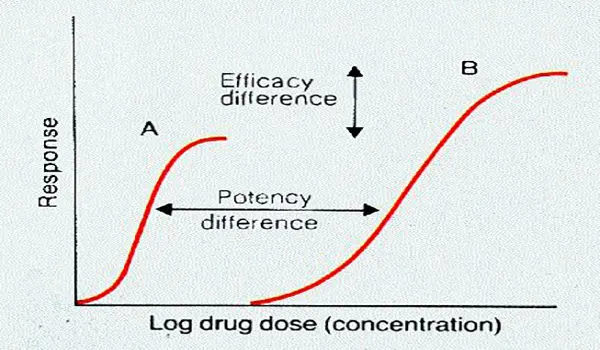Efficacy vs Potency. Potency and efficacy are frequently mixed up, but these terms are not synonymous and used misleadingly. However, it is foremost significant to differentiate the efficacy and potency of a drug for clinical use. Independently, potency and efficacy of drug may vary. Probably from graded dose-response curves, two key properties of drugs can be determined, those are potency and efficacy. Certainly, you may clearly understand the difference between potency and efficacy after reading this article.
1. Definition of Efficacy vs Potency

Efficacy is the ability of a drug after binding with receptors to initiate change which leads to certain effects. Simply, Efficacy (Emax) is the capacity of a drug to produce a maximum response. Also, it is known as maximal efficacy. In other words, Efficacy is the maximal response that can be elicited by the drug [1]. In other words, Efficacy is the ability of a drug to elicit a physiologic response when it interacts with a receptor[3].
On the other hand, Potency is a comparative measure of different doses of two drugs that are needed to produce the same pharmacological effect. It is also known as drug strength. Simply, Potency is the amount of drug needed to produce a certain response [1].
In other words, Potency refers to the concentration (EC50) or dose (ED50) of a drug required to produce 50% of that drug’s maximal effect [2]. Certainly, more the ED 50 of a drug, less the potency and Less the ED50, more the potency. Potency is a measure of the amount of drug necessary to produce an effect of a given magnitude [3].
Table of Contents
2. The core theme of Efficacy vs Potency
Efficacy is therapeutic potency. Whereas, Potency is absolute potency.
3. Estimation of Efficacy vs Potency
Efficacy is estimated by comparing differences in the highest response at high drug concentrations or doses. On the other hand, Potency is estimated by comparing dose (ED50).
4. Depending factor of Efficacy vs Potency
Efficacy depends on the concentration at the site of action, the number of drug-receptor binding, psychological factors and, the efficiency of the coupling of receptor activation to cellular responses. Whereas, Potency of a drug depends on the affinity of the receptors to bind the drug and how effectively the drug-receptor interaction leads to clinical response [4].
5. Decisive component
Efficacy is a decisive component to choose a drug among other drugs of the same kind. While Potency is a decisive component to choose the dose of the drug.
6. Relation with clinical effectiveness
The clinical effectiveness of a drug depends on its efficacy. On the other hand, The clinical effectiveness of a drug does not depend on its potency.
7. Why is efficacy more important than potency?
Potency is less significant than efficacy. While efficacy is more significant than drug potency. Certainly, a drug with greater efficacy than greater potency is more therapeutically beneficial.
8. Usefulness of Efficacy vs Potency
Efficacy may be beneficial in the determination of clinical effectiveness of a drug. While Potency of a drug may be beneficial in the dosage forms design.
9. Example of Efficacy vs Potency
Generally, Morphine produces an optimum level of analgesia which is not possible with any dose of aspirin. Hence, morphine has more efficacy than aspirin. Likewise, is furosemide a diuretic has more capacity to eliminate more salt and fluid from urine than metolazone. So, furosemide has greater efficacy than metolazone.
On the other hand, 500 mg of Paracetamol and 30 mg of morphine used as an analgesic. Here, a small dose of morphine requires to produce an analgesic effect. Thus, morphine is more potent analgesic than Paracetamol.
Summary of the Efficacy vs Potency
| Features | Efficacy | Potency |
| Definition | Efficacy is the ability of a drug to elicit a physiologic response when it interacts with a receptor. | Potency is the amount of drug needed to produce a certain response. |
| Core theme | It is therapeutic potency. | It is absolute potency. |
| Estimation | Efficacy is estimated by comparing differences in the highest response at high drug concentrations or doses. | Potency is estimated by comparing dose (ED50). |
| Depending factor | It depends on the concentration at the site of action, the number of drug-receptor binding, psychological factors and the efficiency of the coupling of receptor activation to cellular responses. | It depends on the affinity as well as efficacy. |
| Decisive component | Efficacy is a decisive component to choose a drug. | Potency is a decisive component to choose the dose of the drug. |
| Clinical effectiveness | It depends on its efficacy. | It does not depend on its potency. |
| Importance | More significant than drug potency. | Less significant than efficacy. |
| Usefulness | Beneficial in the determination of clinical effectiveness of a drug. | Beneficial in the dosage forms design. |
| Example | Morphine has more efficacy than aspirin. | Morphine is s more potent analgesic than Paracetamol. |
Also, you may read:
1st. Difference between pharmacokinetics and pharmacodynamics
2nd. Difference between poison and toxin
3rd. Difference between drug abuse and misuse
4th. Difference between Signs and Symptoms
5th. Agonist, Partial Agonist, Antagonist, Inverse Agonist
If you have any question regarding Efficacy vs Potency, please comment.
References
- Tripathi, K. D. (2013). Essentials of medical pharmacology (7th edition). New Delhi: Jaypee Brothers Medical Publishers.
- Katzung, B. G., Masters, S. B., & Trevor, A. J. (2009). Basic & clinical pharmacology (11th edition.). New York: McGraw-Hill.
- Howland, R. D., & Mycek, M. J. (2006). Lippincott’s illustrated reviews: Pharmacology. Philadelphia: J.B. Lippincott Williams & Wilkins.
- Brandt N. (2013) Dose: Intensity, Response. In: Gellman M.D., Turner J.R. (eds) Encyclopedia of Behavioral Medicine. Springer, New York, NY
Very helping